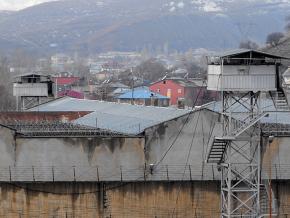Jailed for dissent in Erdoğan’s Turkey
Turkey’s President Recep Tayyip Erdoğan described the failed coup against him in summer 2016 as “a gift from God.” In its aftermath, Erdoğan has used it as a pretext for a purge of his enemies from the state apparatus as well as a campaign of repression against the left and other sources of dissent within Turkish society.
This past summer, Erdoğan won a snap election that allowed him to further consolidate his grip on power, even as the pressures on his regime mount. This is the backdrop to Turkey’s crackdown on dissidents, including the detention of Jacobin contributor Max Zirngast. Here, in solidarity, SW is republishing a Jacobin article about the launching of its campaign to #FreeMaxZirngast, written by and .
OUR COMRADE and co-author, Jacobin contributor Max Zirngast, has now been in Turkish custody for more than a month. Authorities still haven’t brought a formal indictment against him, yet Max is being held in a high-security prison — Sincan-2, about 40 miles west of Ankara — and experiencing severe restrictions on his written correspondence, his visits from friends and family, and his ability to conduct his usual journalism and research.
As with other jailed dissidents in Recep Tayyip Erdoğan’s Turkey, it is unclear when the prosecutor will bring formal charges against Max or when his trial will begin. Applying domestic and international pressure is therefore extremely important — otherwise his pre-trial detention could stretch on indefinitely.

Max, an Austrian national who’s lived in Turkey for the last three years, was arrested in the early morning hours of September 11 by Turkish anti-terror police. Authorities are accusing him of “being a member of the illegal TKP/K” — a patently absurd charge that is being leveled simply because Max has written about, and organized against, Turkey’s authoritarian turn under Erdoğan.
The response of Austrian officials since Max’s detention has been disappointing. Following a one-month silence, Austrian Foreign Affairs Minister Karin Kneissl recently stated that the government “demanded a fair process from the Turkish Minister of Foreign Affairs. As usual in such cases, the path of diplomacy is taken.” In another press release, she admitted that the government doesn’t know how long pre-trial custody will last, and emphasized again that the means of “silent diplomacy” are being employed.
We find it totally unacceptable that the Austrian government, as well as the international media, is playing the game according to the rules of the Turkish government. Analogous cases in the past — including those of Deniz Yücel, Peter Steudtner, and Meşale Tolu — teach us one thing: the only way to make the Erdoğan regime act is to increase the pressure. Simply asking for a “fair process” is ridiculously inadequate.
To that end, we’ve launched an international solidarity campaign, #FreeMaxZirngast. Here are a few actions that supporters can take:
Sign the petition calling for Max’s release.
Send a letter or postcard to Max. The campaign takes care of translations into Turkish.
Volunteer to translate for the campaign (especially German to English and German to Turkish).
Donate. Because Max is a vegan animal rights activist, he must feed himself through private purchases at the extremely overpriced prison market. Donations are therefore very important to help finance his expenditures. For more information on sending a letter or donating, send your questions and contact information to [email protected], and we will forward it to the campaign for Max.
In recent days, in the wake of Jamal Khashoggi’s murder, Erdoğan has positioned himself as something of a defender of free speech. Max’s case — and so many like it — show just how perverse that claim is. We stand resolutely with all those fighting for democracy in Turkey and demand Max’s immediate release.


